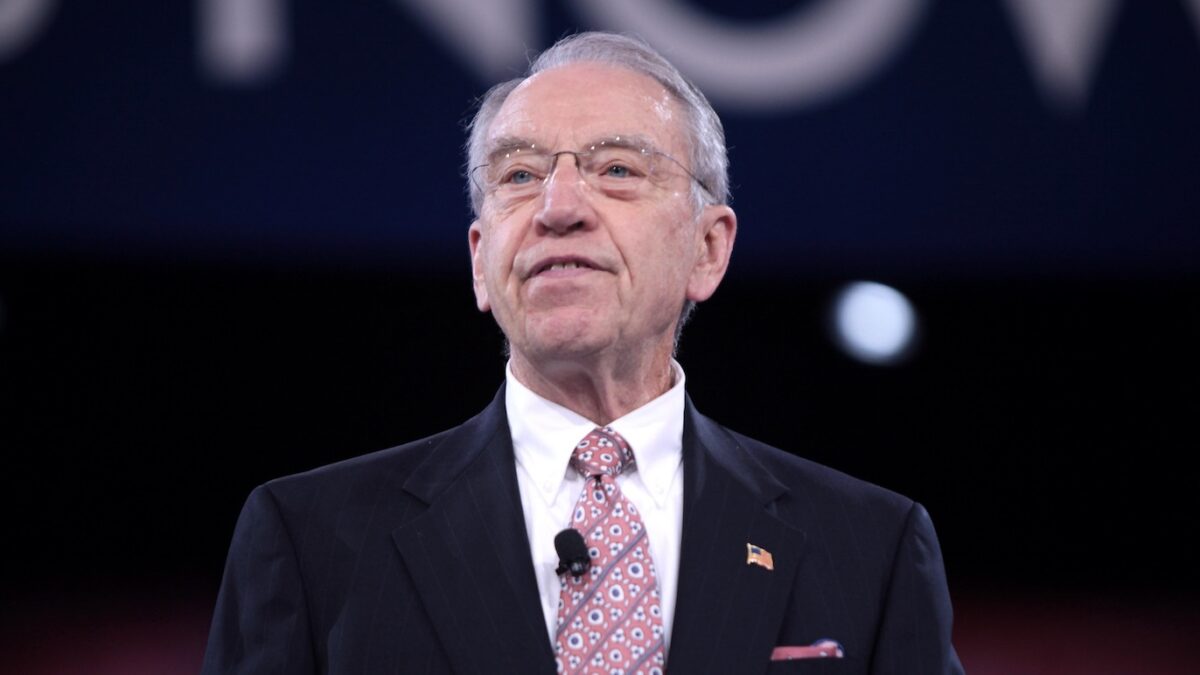FBI Director Christopher Wray alleged on Tuesday that he did not learn of the confidential human source’s (CHS) claim that the Ukrainian energy giant Burisma had bribed the Bidens until “much, much, much more recently than anything around 2020.” Wray’s testimony cannot be squared with earlier testimony from whistleblowers and the Pittsburgh U.S. attorney — unless those investigating Hunter Biden buried the CHS’s reporting.
On Tuesday, Sen. Chuck Grassley, R-Iowa, drilled the FBI director on the bureau’s handling of reporting from June 2020 of a longtime, “highly credible” CHS that implicated the Biden family in a bribery scandal. At the time, at the direction of then-Attorney General William Barr, the U.S. attorney’s office in Pittsburgh was screening evidence related to Ukrainian corruption. As part of that review process, then-U.S. Attorney Scott Brady requested that FBI agents reinterview a CHS who had previously made a passing reference to Hunter Biden and his service on Burisma’s board of directors.
Further questioning of the CHS resulted in the explosive FD-1023 that Grassley released in July. That FD-1023 summarized the CHS’s reporting that Burisma had paid Hunter and Joe Biden each $5 million in bribes so the then-vice president would “protect” Burisma “from all kinds of problems.” Those alleged bribes were in addition to the more than $4 million in total Burisma reportedly paid to Hunter Biden and his business partner Devon Archer for sitting on Burisma’s board of directors.
When did Wray first learn about the FD-1023 that Grassley inquired about during Tuesday’s Judiciary Committee hearing? And what steps were taken to investigate the substance of the CHS’s allegations?
Wray failed to provide a specific time frame for when he learned about the existence of the FD-1023, but he said it was “much, much, much more recently than anything around 2020, that’s for sure.”
But how can that be? After all, when questioned by the House Judiciary Committee, Brady testified that FBI headquarters was required to “sign off for any investigative steps that FBI Pittsburgh was asked to take by” his office. The former Pittsburgh U.S. attorney reiterated this point, testifying: “It was my understanding that they could not take any steps absent the approval, the review and approval of FBI headquarters, not just the leadership of FBI Pittsburgh.” And later, when asked to elaborate on challenges with the FBI, Brady noted: “It was my understanding that FBI headquarters had to sign off on every assignment, no matter how small or routine, before they could take action.”
Brady further testified that every 30 days, the FBI had to renew the assessment it had opened to assist the U.S. attorney’s office in screening the material related to Ukraine. And while normally local supervisors could reauthorize the assessment, in the case of the Pittsburgh assessment, Brady testified that “it required 17 different people, including mostly at the headquarters level to sign off on it before the assessment could be extended.”
The IRS whistleblowers have similarly claimed FBI headquarters held a firm hand on all aspects of their investigation.
Given the high-profile nature of the investigation and the extensive oversight by FBI headquarters over both the Pittsburgh and the Delaware FBI offices, Wray’s stated lack of knowledge about the FD-1023 until recently suggests someone was burying that damning report.
One would hope Wray’s response would be outrage, but the FBI director seemed unbothered.
Worse still, when it came time to answer Grassley’s second question concerning what investigative steps the FBI had taken in response to the CHS’s reporting, the FBI director implied that Brady’s office was responsible for investigating the FD-1023 and had ended the investigation by closing out the assessment.
Regarding that assessment being run out of Pittsburgh, Wray testified, it was “my understanding … that there was agreement among the team about what steps needed to be taken, and with the closing of that assessment.”
This response wrongly suggests that the failure to investigate the FD-1023 somehow is the fault of the former U.S. attorney and that the “closing of that assessment” ended the matter.
But as The Federalist previously reported, Brady testified before the House Judiciary Committee that the Pittsburgh office had corroborated several details contained in the FD-1023 but lacked the authority to take further investigative steps. Instead, Brady’s team provided the Delaware U.S. attorney’s office with the FD-1023, and Brady’s lead assistant U.S. attorney briefed the Delaware office about it.
Among other things, the Pittsburgh lead assistant U.S. attorney told the head Delaware prosecutor on the Hunter Biden investigation that the FD-1023 “was from a credible CHS that had a history with the FBI, and that it was not derived from any of the information from Mr. Giuliani.” Further, in briefing the Delaware U.S. attorney’s office, Brady’s team confirmed that they believed the FD-1023 had indicia of credibility that merited further investigation.
The lead lawyer from the Pittsburgh U.S. attorney’s office also made “recommendations about possible investigative avenues that we would recommend that they take,” Brady said. When the House Judiciary Committee pushed Brady on this point, he confirmed that as part of the briefing, his office recommended certain actions, but he did not elaborate on the recommendations.
Brady further testified that the FBI closed its assessment because the agents had finished assisting him in the screening of the Ukrainian evidence and that the FD-1023 was sent to Delaware for further investigation.
Wray’s raising of the closing of the assessment in Pittsburgh in response to Grassley’s question about what steps the FBI took to investigate the FD-1023 was a clear effort to misdirect his audience. It was an irrelevant reference that ignored Grassley’s core question, which concerned what Delaware did once it received the FD-1023.
The FBI director opting for misdirection instead of transparency suggests he knows precisely what the bureau did in response to evidence implicating the Bidens in a bribery scandal: nothing.









